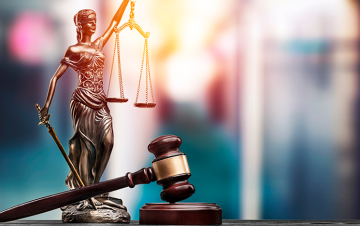Liability for violation of property rights in Ukraine
Property ownership is one of the fundamental rights of every citizen and legal entity in Ukraine. However, sometimes this right can be violated, which can lead to serious consequences for the violator. Ukrainian legislation provides for a number of measures in case of violation of property rights.
Civil liability
One of the main methods of compensation for damage caused by violation of property rights is civil liability. According to the Civil Code of Ukraine, a person who has caused damage to someone else's property is obliged to compensate for the damage caused. This may include property value, lost income, restoration costs, or compensation for other damages resulting from the violation of property rights.
Criminal liability
In cases where the violation of property rights occurs through criminal activity, the guilty persons may be held criminally liable.
Criminal offenses against property in Ukraine include sixteen acts, namely:
1. Theft (Article 185 of the Criminal Code of Ukraine) – secret theft of someone else's property.
2. Robbery (Article 186 of the Criminal Code) – open theft of someone else's property.
3. Robbery (Article 187 of the Criminal Code) is an attack with the aim of seizing someone else's property, accompanied by the use of violence or threats of violence that may pose a threat to the life or health of the victim.
4. Theft of energy resources (Article 188-1 of the Criminal Code) – unauthorized and unaccounted for use of water, electricity, and thermal energy.
5. Extortion (Article 189 of the Criminal Procedure Code) – a demand to transfer someone else's property using threats.
6.Fraud (Article 190 of the Criminal Code) – appropriation of someone else's property by deception or abuse of power.
7. Appropriation, embezzlement or possession of property (Article 191 of the Criminal Code) by abuse of official position by an official.
8. Causing property damage by deception or abuse of trust
(Article 192 of the Criminal Code).
9. Illegal appropriation by a person of found or someone else's property or treasure (Article 193 of the Criminal Code) that happened to be in her possession .
10. Deliberate destruction or damage to property (Article 194 of the Criminal Code).
11. Deliberate damage to electric power facilities (Article 194-1 of the Code of Civil Procedure), which led to a disruption of the facilities' operation or posed a danger to people's lives.
12. Threat of destruction of property (Article 195 of the Criminal Code) by means of general danger.
13. Careless destruction or damage to property (Article 196 of the Criminal Code).
14. Violation of duties regarding the protection of property (Article 197 of the Criminal Code) – violation of the terms of storage of someone else's property, which caused serious consequences.
15. Arbitrary occupation of a plot of land and arbitrary construction (Article 197-1 of the Criminal Code), if such occupation caused significant damage to the property owner.
16. Purchase, receipt, storage or sale of property that was obtained through criminally illegal actions (Article 198 of the Criminal Code).
Liability for crimes against property may include a fine, restriction of freedom, community service, correctional work, and imprisonment.The type and degree of responsibility for the committed crime against property depends on the severity of the crime, the amount of damage caused, the repeatability of the crimes committed, the conditions of the crime, the subjects of the crime, their prior agreement or deliberate organization to commit crimes and other aggravating or mitigating circumstances, which are taken into account by the court during the qualification of illegal actions and the imposition of punishment.
In criminal proceedings against property, it is better to immediately involve a defense attorney and a representative of the victim. The goal is not only to bring the culprit to justice, but also to collect damages, especially if the stolen property is damaged or destroyed.
Administrative responsibility
Violation of property rights may also lead to administrative liability, which involves the application of fines or other administrative sanctions depending on the severity of the violation.
The distinction between a criminal offense and an administrative misdemeanor depends on the amount of damage caused.
To determine the type of liability for stolen property of others, the value of the stolen property is determined, and if the value of the stolen property does not exceed 0.2 of the tax-free minimum income of citizens, then such an offense is considered an administrative offense and liability arises in accordance with the Code of Ukraine on Administrative Offenses.
For example, in 2024, an amount equal to 302.80 hryvnias, which is 0.2 of the tax-free minimum, is taken into account for qualification under Article 51 of the Code of Ukraine on Administrative Offenses. If the theft of property caused damage to the owner of more than 302.80 hryvnias, the crime is classified according to the corresponding article of the Criminal Code of Ukraine.
The Code of Ukraine on Administrative Offenses, in addition to Article 51 - petty theft of someone else's property, contains six more articles that define acts that qualify as administrative offenses.
Such actions are: violation of state property rights to subsoil (Article 47), water (Article 48), forests (Article 49), animal world (Article 50), violation of rights to the object of intellectual property rights (Article 51-2), violation of rights to geospatial data and metadata (Article 51-4).
Compensation for moral damage
In addition to material damage, violation of property rights can also cause moral damage.In such a case, the offender may be obliged by the court to compensate the victim for mental suffering or moral injury.
Conclusion
The guarantee and protection of property rights are key elements of the country's legal system. Responsibility for the violation of property rights should be appropriate to ensure justice and protection of the rights of every citizen and legal entity in Ukraine.
Legal service "Consultant" provides legal assistance in any situation. Our lawyers, having conducted a legal analysis of a specific situation, will provide representation and defense in court and will participate in a court hearing in any city of Ukraine. A lawyer in court and a legal process with a lawyer are a guarantee of quality protection of your rights and interests.
































